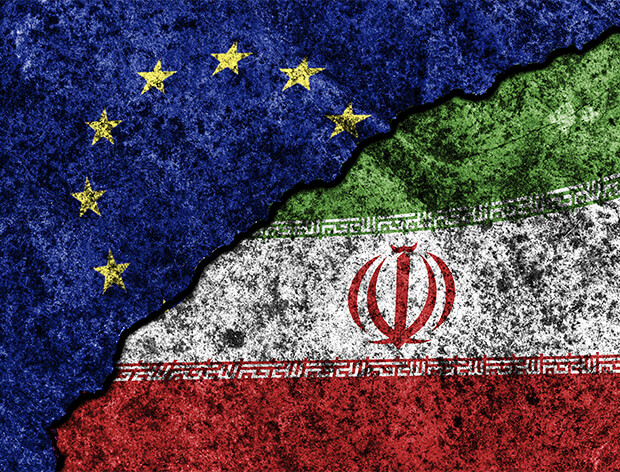European government officials have announced that Instex, the European trade vehicle set up to bypass US sanctions on Iran, has successfully completed its first transaction.
“France, Germany and the United Kingdom confirm that Instex has successfully concluded its first transaction, facilitating the export of medical goods from Europe to Iran,” the three governments say in a joint statement made on Tuesday. “These goods are now in Iran.”
The companies involved are not named, but GTR understands the value of the transaction was around £500,000.
There have long been doubts over the viability of Instex, which works by offsetting transactions so funds do not have to cross international borders, particularly due to hostility from US government authorities towards the project.
The mechanism was developed after US President Donald Trump withdrew his country from the Joint Comprehensive Plan of Action (JCPOA), the historic nuclear deal that resulted in the lifting of EU and US sanctions on Iran, in May 2018.
Iran then withdrew in January this year after a US air strike killed Qasem Soleimani, commander of Iran’s elite Quds Force.
Despite those tensions, the three European governments reiterate their commitment to expanding trade with the embattled Middle Eastern country.
“Instex aims to provide a sustainable, long-term solution for legitimate trade between Europe and Iran as part of the continued efforts to preserve the JCPOA,” the joint statement says. “Now the first transaction is complete, Instex and its Iranian counterpart STFI will work on more transactions and enhancing the mechanism.”
The transaction takes place amid growing international pressure on the US to soften its stance, particularly as Iran continues to fight the spread of Covid-19. As of press time, Iranian government figures show more than 3,000 people have died after contracting the virus, with the number of confirmed cases totalling nearly 50,000.
Foreign minister Mohammad Javad Zarif said last month it is “immoral to let a bully kill innocents”, referring to claims from President Hassan Rouhani that efforts to halt the spread of coronavirus are being “severely hampered by US sanctions”.
However, there are still concerns that larger corporates and financial institutions will be unwilling or unable to support Instex, meaning its capacity is likely to remain limited.
Part of the issue is that financial institutions are vulnerable to enforcement action from the Office of Foreign Assets Control (OFAC) even if they are not based in the US. Any interaction with the US financial system could be enough to provoke an investigation or even financial penalty from the regulator.
According to John E. Smith, a partner at Morrison Foerster in Washington DC and a former OFAC director, the situation is unlikely to have “changed dramatically”.
“Instex has had its first transaction – a test case in some senses – but it remains unclear whether it will be a system that can become operational in a significant way,” he tells GTR.
Smith adds that other vehicles for providing aid in Iran have emerged since Instex was developed, which have gathered greater support from the US government.
Notably, the US Department of the Treasury announced in February that the Swiss Humanitarian Trade Agreement (SHTA) is fully operational, providing a government-backed channel for sending shipments of food and medical supplies to Iran. Pilot operations at the start of the year facilitated a shipment of medicines valued at around US$2.5mn.
“The Swiss humanitarian channel might provide a safer or risk-free alternative for companies and governments that want to send those goods to Iran, while Instex remains somewhat of a risk and a test case,” Smith says.
Another concern for financial institutions is around due diligence on the recipients of transactions, particularly after US claims that Iranian officials have previously used the provision of medical supplies as cover for providing resources to the country’s military.
Though the French, German and British governments say they carry out extensive due diligence on the recipients of transactions via Instex, Morrison Foerster’s Smith says financial institutions cannot rely on that to eliminate the threat of OFAC enforcement action.
“Under the liability regime of OFAC, you’re not allowed to pass on your liability to someone else. So if you violate the sanctions rules you’re liable for a penalty, even if you could point to someone else as having done the due diligence,” the lawyer says.
“It is likely to minimise the extent of a penalty you received, or perhaps even ensure you did not receive a penalty at OFAC’s discretion, if you reasonably relied on someone else for the diligence – but that would have to be well established under the system that was set up.”







